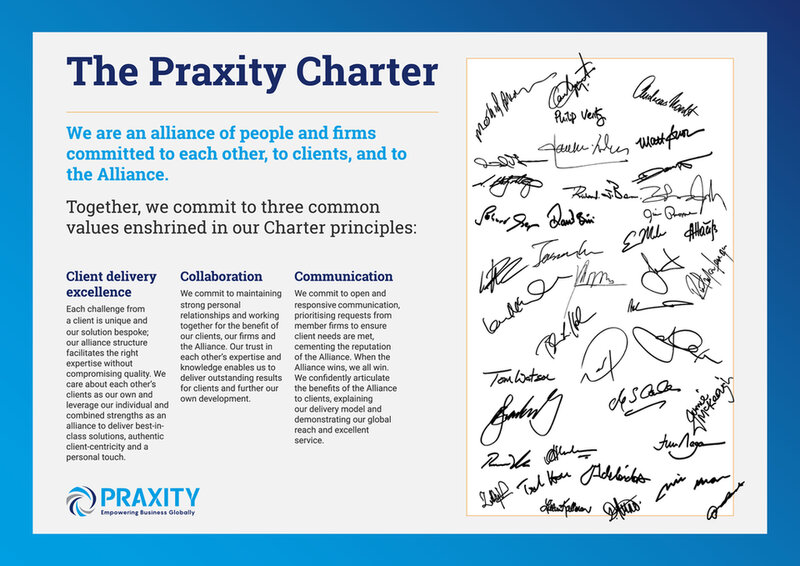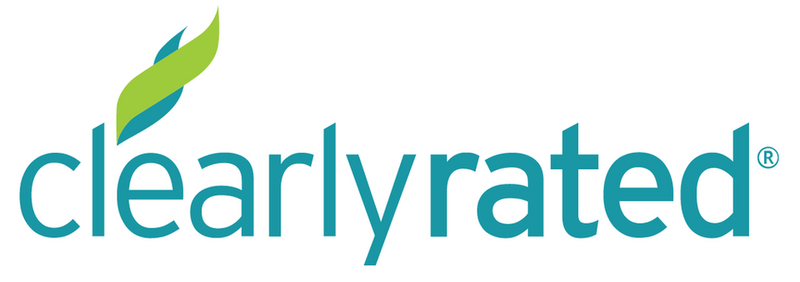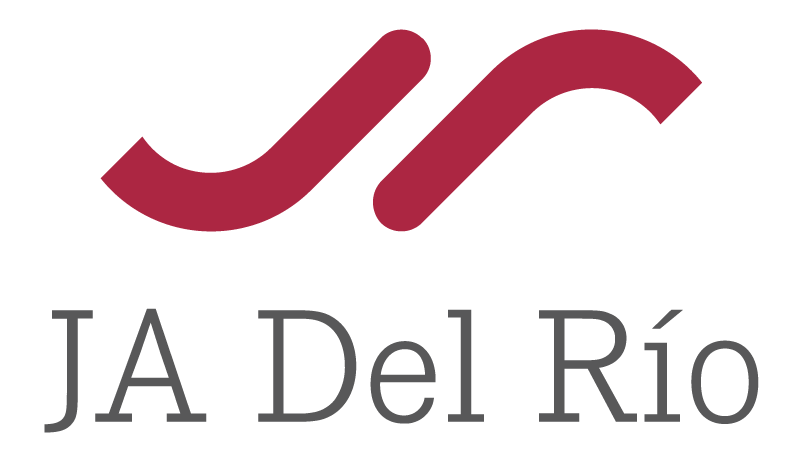Praxity Global Alliance - Thought Leadership
Accounting for change: ESG and Modern Slavery today
Geopolitically, the world is rapidly changing. Little is certain and, naturally, this triggers a fear of risk, meaning that sustainability efforts are not always prioritised.

There is, however, a crucial need to address Modern Slavery within organisations. Modern Slavery affects approximately 50 million people across the globe. The definition encompasses forced labour (where violence, threats or intimidation push an individual into work against their will), debt labour (where loans or cycles of debt entrap a person into work), human trafficking (the unlawful act of transporting or coercing people into work through force, fear or coercion), and numerous other forms of exploitation.
As we consider how different regions across the world are responding to the changing landscape of ESG, we identify key trends and regional distinctions, and suggest a picture moving forward - starting with the urgent need to confront Modern Slavery.

Samantha Louis
CEO, Praxity

The Charter itself signifies the culmination of extensive research, conducted by our external partner agency. The process began with a consultation with the Board, swiftly followed by a selection of in-depth telephone interviews; next, we ensured that every single Member had their voice heard at our Global Conference.
Our takeaway was clear; the Alliance provides critical global connections, with Member Firms forming strong relationships between one another, throughout the world. The personal nature of these relationships builds trust, enabling members to refer work with deep-seated confidence. Client satisfaction comes first, and the true strength of the Alliance is the ability to put the needs of clients above the usual dividing lines of geography, discipline and firm.
Quickly, it became evident to us that Member Firms treat each other’s clients as if they were their own, providing responsive and effective solutions to unlock new value on an international scale. The practice of open and proactive collaboration was initially adopted intuitively, with Member Firms naturally pooling expertise without needing a prompt. This is something we remain deeply proud of and, in celebration of this, we chose to commemorate this unique form of collaboration through a one-of-a-kind codified document: The Praxity Charter.
The final charter was officially unveiled at the Global Leadership Conference in Rome, where it was signed by each of our Alliance Member Firms. At its core, the Charter speaks to the values that define Praxity: client delivery excellence, unparalleled communication, and international collaboration.
Each of these three values are unpacked in more detail throughout the Charter.

Daxin COO Yue Hong Meets with Daxin Saudi Chairman Abdullah Fahad Al sahli. Credit: Daxin Global
The value of transparency in combating Modern Slavery
When combating modern slavery, transparency is essential. It is crucial that companies have accurate Modern Slavery Statements, reflecting the accountability of the organisation and incorporating ethical practices throughout the supply chain. Modern slavery sits squarely at the intersection of the 'S' and 'G' pillars of ESG — embedding human rights into governance systems and social responsibility strategies is now recognised as a foundational corporate duty. This is especially true within the accounting sector, where firms are critical to client compliance, governance and delivery. As trusted advisors, it’s essential that accounting professionals build trust amongst stakeholders through regulatory compliance.
What’s more, the business case for embedding transparency into organisations is an often underappreciated fact. Companies with strong ESG credentials often vastly outperform their counterparts. According to a study conducted by NatWest, companies that have embedded strong ESG practices ‘have on average outperformed by 14.4% in emerging markets and 5.2% in developed markets’. There is value in transparency, creating a more attractive offering for stakeholders and investors alike. Certainly, it seems there is no turning back, as momentum continues to grow amongst stakeholders for broader ESG policy adoption.
Clear, forward-thinking ESG policies also hold value for talent. This is particularly true for future generations, who have grown up with a deep cultural awareness of the tangible impacts of the climate crisis. A study from Boston Consulting Group emphasises the importance of ESG policies for talent attraction and retention. According to the study, 13% of employees across New Zealand cited ‘strong ESG commitments’ as a top reason for choosing their current employer. Meanwhile, 11% suggested that ESG policies were a consideration for staying with their current employer.
An ethically united alliance
Within Praxity, the alliance is doubling down on our efforts to unite firms across the world in pursuit of stronger ESG outcomes. Our ESG Working Group, founded in 2021, exists as a dynamic forum to explore strategy and workshop new, innovative approaches to the ever-evolving ESG landscape. Between firms and across the world, the ESG Working Group shares best practices, case studies and methodologies. This collaborative approach empowers firms to lean on one another, benchmarking and building out ESG service lines while supporting their client needs.
One area of growth is a renewed emphasis on creating Modern Slavery Statements. Firms support one another in preparing and verifying Modern Slavery Statements, ensuring compliance with local legislation such as the UK Modern Slavery Act 2015 and the Australian Modern Slavery Act 2018. Offering specialist skill sets in nearly 60 accounting and consulting service areas, Praxity member firms support one another in identifying risks within their operations.
Failure to comply with modern slavery legislation can result in significant legal exposure and liability for companies. In Australia, non-compliance can lead to formalised warnings and potential penalties. In Canada, the Fighting Against Forced Labour and Child Labour in Supply Chains Act (Bill S-211) can lead to financial penalties for non-compliance. In the UK, shareholder activism can lead to potential legal action against companies that fail to address modern slavery risks. Other countries have also implemented penalties: France's Duty of Vigilance Law allows affected parties to sue non-compliant companies, Germany's Act on Corporate Due Diligence in Supply Chains includes substantial fines and Switzerland's Responsible Business Initiative campaign proposes non-tax-deductible fines of up to €10m. These enforcement measures highlight the importance of adhering to modern slavery legislation to avoid legal and reputational risks.
Firms that are attuned to ESG considerations are more adept at managing risk, creating reliable systems to measure the impact of ESG. Now, more than ever, rigour is crucial; anti-slavery practices are now recognised as a core risk-management tool, ensuring sustained longevity through diligence, foresight and shared learning.
A global challenge
Globally, Modern Slavery remains a persistent issue, with a variety of approaches being taken by different countries and continents. This manifests in terms of policy and politics, regulatory frameworks, targets, and reporting.
In the Asia-Pacific region, Praxity firm Moores Rowland is globally recognised as a leader in the ESG field. Based in Indonesia, CEO James Kallman has been instrumental in building this strategy from the ground up. Under his leadership, the firm has adopted an approach that emphasises the ‘S’ in ESG, and therefore the social implications of focusing on ESG in the workplace.
The origins of this strategy can be traced to the initial implementation of its Human Rights Audit Practice, an initiative celebrated in 2012 through the winning of the prestigious ‘Audit Innovation of the Year’ award from the International Accounting Bulletin. This strategy, designed to identify and prevent potential abuses of human rights within the industry, was developed to align with best practice from the United Nations, alongside Indonesia’s National Action Plan on Business and Human Rights.
Since then, Moores Rowland has continued to demonstrate its commitment to implementing fair business practices, including a workshop initiative hosted in the first quarter of 2025 to aid small and medium enterprises in establishing fair business practices. Kallman notes that the current emphasis on ESG shows no signs of slowing down, stating that “Human rights auditing has picked up steam over the last few years due to consumers wanting to know that the products they purchase and use are sustainable, and not a result of rampant human rights violations, and also from the need for investors to better know the companies they are investing in”.
Broadening the lens
Looking at ESG more broadly, there are huge variations in terms of global adoption and regulation. Throughout Asia, for instance, awareness has been rapidly increasing - but there have been varying levels of adoption. There has been a move toward standardised reporting, and the continent is - generally speaking - beginning to be more closely aligned with global standards. For instance, the Hong Kong Exchanges and Clearing Limited (HKEX) will require mandatory client-related disclosures from 2026 onwards, bringing the regulations into line with the International Sustainability Standards Board (ISSB). Similarly, the Securities and Exchange Board of India (SEBI) is reviewing its ESG disclosure requirements, aiming to place greater emphasis on accuracy and feasibility. Indonesia, in particular, is forging the way - by mandating Human Rights Audits by 2027 and adopting IFRS S1 and S2 standards.
In contrast, Africa has adopted an entirely different approach to ESG. As an emerging market, there is less alignment on approach, with more fragmented initiatives across the continent. In response to this, the Pan African Federation of Accountants has founded a Centre of Excellence, designed to introduce more uniformity in the approach to ESG across the region.
The EU is widely recognised as a global leader in terms of environmental regulation. Notably, the Corporate Sustainability Reporting Directive (CSRD) requires mandatory ESG reporting from large companies. Naturally, this improves transparency - however, recent conversation calls into question the strain that this puts businesses under, potentially hindering growth through overzealous regulatory burdens.
However, there is also significant pushback against ESG adoption in various regions, impacting its progress. In the US, political and economic pressures have led to restrictions on ESG-based investment strategies. Europe is also experiencing a recalibration of its ESG commitments, with the EU reducing reporting requirements to ease corporate burdens. Despite these challenges, the principles of ESG remain essential to good business practice, ensuring business resilience in the face of an uncertain regulatory and legal reporting environment. While there are delays and challenges to reporting requirements, these headwinds should be seen as opportunities to strengthen ESG strategies and practices.
Throughout Praxity, our member firms offer counsel to one another, sharing their expertise from across the globe. This is where the true strength of our alliance lies: amidst a complex and rapidly changing regulatory landscape, experts in their field can collaborate on a global level to deliver high quality solutions to complex client challenges. Member firms often provide tailored consulting services, with a focus on driving an understanding of a stronger control environment to adequately address the risks identified above through the development of suitable business processes and controls. This can then be audited as well. The combined efforts of our member firms help to combat modern slavery by promoting transparency, working alongside NGOs and regulatory bodies to deliver world-class ESG solutions that move the needle for clients, communities and individuals alike.
Adopting a future-focused mindset
Long gone are the days when modern slavery compliance was seen as a ‘tick-box’ exercise; the evidence shows it’s essential that quality firms position themselves as leaders in the field.
This sentiment has been echoed by Edward Olson, Partner and National Leader of ESG at MNP, who suggests that corporations take a proactive, strategic approach:
“Look to the lawsuits against ESG and understand this is all about how companies don’t want to be told what to do. However, changing legal and regulatory environments are squeezing those who purposely set out to do nothing”.
Olson notes that it is essential to tackle the matter head on, stating that “Eventually they will have to act, which is strategically a bad move; being forward-looking is a key tenet of good corporate leadership. The topics embedded across the ESG paradigm need to be considered; a failure to do so is a failure to understand the numbers”.
Looking toward the future, firms will likely continue to build out their ESG service lines and approaches to tackling Modern Slavery as a business imperative. In all likelihood, these firms will continue to become increasingly specialised, responding to complex market demands and regulatory requirements.
In parallel to this, AI and technological advancements hold the potential to rapidly transform the sector. Through AI, large quantities of data can be processed and managed at speed, enhancing human capabilities. This increases trust and transparency, ensuring that ESG reporting can contribute to a more sustainable future, both for business and for the planet. Olson states that “Emerging technologies such as blockchain enable immutable tracking of supply chain provenance, while AI-driven analytics tools identify hidden patterns of labour exploitation risk across vast supplier networks.” And therefore, it is vital for firms to enhance their understanding and deployment of these tools for investigation and assurance activities, making this a key area of focus going forward.
Praxity firms offer a wealth of global knowledge in the ESG and modern slavery arena, providing expert guidance to navigate these complex issues. Head to www.praxity.com to learn how our members can support your business in achieving sustainable and ethical practices.



